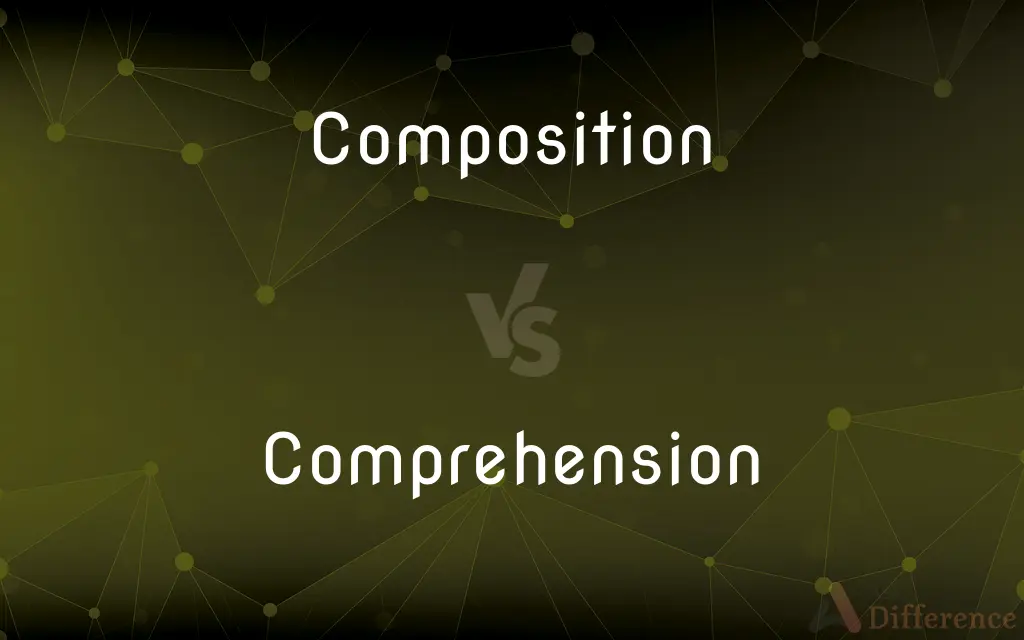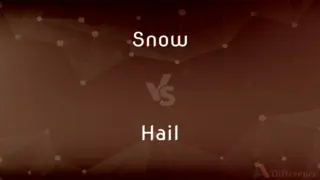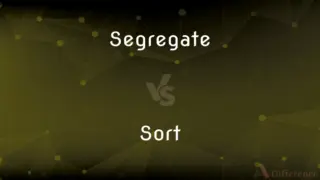Composition vs. Comprehension — What's the Difference?
Edited by Tayyaba Rehman — By Fiza Rafique — Updated on October 6, 2023
Composition refers to creating or combining elements to form a whole, while Comprehension is understanding or grasping meaning.

Difference Between Composition and Comprehension
Table of Contents
ADVERTISEMENT
Key Differences
Composition generally denotes the act of putting things together to create something new. It involves assembling or constructing, whether it be in art, writing, or music. In contrast, Comprehension alludes to the capability to understand and interpret information, whether it's written, spoken, or observed.
When one creates a piece of writing, that act is Composition. However, when a reader deciphers and understands that piece, they are demonstrating Comprehension.
While Composition emphasizes the creative or assembling process, Comprehension zeroes in on the cognitive ability to grasp and interpret.
Both terms, Composition and Comprehension, play pivotal roles in the realm of literature and education. Composition allows for expression, while Comprehension ensures that the expressed message is understood.
Comparison Chart
Definition
The act of creating or assembling.
The ability to understand or grasp meaning.
ADVERTISEMENT
Associated Domain
Writing, music, art.
Reading, listening, observing.
Primary Focus
Creation or combination.
Interpretation or understanding.
In Education
Taught as a creative process.
Taught as a cognitive skill.
Key Element
Assembling parts into a whole.
Grasping the meaning of information.
Compare with Definitions
Composition
The way in which a whole is made up.
The Composition of the team was diverse.
Comprehension
Grasping the meaning of something.
His Comprehension of the subject was unmatched.
Composition
The combining of distinct parts or elements to form a whole.
Comprehension
A test or exercise to evaluate understanding.
The English exam had a Comprehension section.
Composition
The manner in which such parts are combined or related.
Comprehension
A cognitive skill to interpret information.
The course aimed to enhance students' Comprehension abilities.
Composition
General makeup
The changing composition of the electorate.
Comprehension
The ability to understand text or speech.
Reading regularly can improve one's Comprehension skills.
Composition
The result or product of composing; a mixture or compound.
Comprehension
Fully understanding a particular subject.
Her Comprehension of the topic was clear from her presentation.
Composition
Arrangement of artistic parts so as to form a unified whole.
Comprehension
The act or fact of grasping the meaning, nature, or importance of; understanding.
Composition
The art or act of composing a musical or literary work.
Comprehension
The knowledge that is acquired in this way.
Composition
A work of music, literature, or art, or its structure or organization.
Comprehension
Capacity to include; comprehensiveness.
Composition
A short essay, especially one written as an academic exercise.
Comprehension
(Logic) The sum of meanings and corresponding implications inherent in a term.
Composition
(Law) A settlement whereby the creditors of a debtor about to enter bankruptcy agree, in return for some financial consideration, usually proffered immediately, to the discharge of their respective claims on receipt of payment which is in a lesser amount than that actually owed on the claim.
Comprehension
Thorough understanding.
Students will be tested on their comprehension of sentences in the foreign language.
Composition
(Linguistics) The formation of compounds from separate words.
Comprehension
(logic) The totality of intensions, that is, attributes, characters, marks, properties, or qualities, that the object possesses, or else the totality of intensions that are pertinent to the context of a given discussion.
Composition
(Printing) Typesetting.
Comprehension
(programming) A compact syntax for generating a list in some functional programming languages.
Composition
The act of putting together; assembly.
Comprehension
(Christianity) The inclusion of nonconformists within the Church of England.
Composition
A mixture or compound; the result of composing.
Comprehension
The act of comprehending, containing, or comprising; inclusion.
In the Old Testament there is a close comprehension of the New; in the New, an open discovery of the Old.
Composition
The proportion of different parts to make a whole.
Comprehension
That which is comprehended or inclosed within narrow limits; a summary; an epitome.
Though not a catalogue of fundamentals, yet . . . a comprehension of them.
Composition
The general makeup of a thing or person.
Comprehension
The capacity of the mind to perceive and understand; the power, act, or process of grasping with the intellect; perception; understanding; as, a comprehension of abstract principles.
Composition
(obsolete) An agreement or treaty used to settle differences; later especially, an agreement to stop hostilities; a truce.
Comprehension
The complement of attributes which make up the notion signified by a general term.
Composition
(obsolete) A payment of money in order to clear a liability or obligation; a settling or fine.
Comprehension
A figure by which the name of a whole is put for a part, or that of a part for a whole, or a definite number for an indefinite.
Composition
A payment of fine in order to settle a (usually minor) criminal charge.
Comprehension
An ability to understand the meaning or importance of something (or the knowledge acquired as a result);
How you can do that is beyond my comprehension
He was famous for his comprehension of American literature
Composition
(legal) an agreement or compromise by which a creditor or group of creditors accepts partial payment from a debtor.
Comprehension
The relation of comprising something;
He admired the inclusion of so many ideas in such a short work
Composition
An essay.
Composition
(linguistics) The formation of compound words from separate words.
Composition
A work of music, literature or art.
Composition
(printing) Typesetting.
Composition
(mathematics) Applying a function to the result of another.
Composition
(physics) The compounding of two velocities or forces into a single equivalent velocity or force.
Composition
(obsolete) Consistency; accord; congruity.
Composition
Synthesis as opposed to analysis.
Composition
The arrangement and flow of elements in a picture.
Composition
(object-oriented programming) Way to combine simple objects or data types into more complex ones.
Composition
The act or art of composing, or forming a whole or integral, by placing together and uniting different things, parts, or ingredients.
Composition
The state of being put together or composed; conjunction; combination; adjustment.
View them in composition with other things.
The elementary composition of bodies.
Composition
A mass or body formed by combining two or more substances; as, a chemical composition.
A composition that looks . . . like marble.
Composition
A literary, musical, or artistic production, especially one showing study and care in arrangement; - often used of an elementary essay or translation done as an educational exercise.
Composition
Consistency; accord; congruity.
There is no composition in these newsThat gives them credit.
Composition
Mutual agreement to terms or conditions for the settlement of a difference or controversy; also, the terms or conditions of settlement; agreement.
Thus we are agreed:I crave our composition may be written.
Composition
The adjustment of a debt, or avoidance of an obligation, by some form of compensation agreed on between the parties; also, the sum or amount of compensation agreed upon in the adjustment.
Compositions for not taking the order of knighthood.
Cleared by composition with their creditors.
Composition
Synthesis as opposed to analysis.
The investigation of difficult things by the method of analysis ought ever to precede the method of composition.
Composition
A mixture of ingredients
Composition
The way in which someone or something is composed
Composition
The spatial property resulting from the arrangement of parts in relation to each other and to the whole;
Harmonious composition is essential in a serious work of art
Composition
A musical work that has been created;
The composition is written in four movements
Composition
Musical creation
Composition
The act of creating written works;
Writing was a form of therapy for him
It was a matter of disputed authorship
Composition
Art and technique of printing with movable type
Composition
An essay (especially one written as an assignment);
He got an A on his composition
Composition
Something that is created by arranging several things to form a unified whole;
He envied the composition of their faculty
Composition
The act of creating written content.
The student's Composition on climate change was insightful.
Composition
A piece of music or art.
Beethoven's Compositions are timeless classics.
Composition
The process of combining elements.
The chemical Composition was volatile.
Composition
A creative endeavor in literature or arts.
Students took a Composition class to improve their writing skills.
Common Curiosities
How can one improve their Composition skills?
Regular practice, feedback, studying exemplary works, and attending workshops can enhance Composition skills.
How is Comprehension evaluated in school?
Comprehension is often evaluated through exercises that test a student's understanding of read or heard material.
Can Composition be associated with arts other than writing?
Yes, Composition can refer to creations in music, visual arts, and other creative endeavors.
What does Composition primarily refer to in an academic setting?
In academia, Composition often refers to the act of creating written content or essays.
Is Composition limited to language?
No, Composition spans various domains, including music, art, and even chemical formulas.
Are there exercises to boost Comprehension abilities?
Yes, reading varied materials, summarizing, questioning, and discussion can bolster Comprehension.
Does Composition always mean creating from scratch?
Not always. Composition can also involve combining existing elements in a novel way.
Can Comprehension vary between individuals?
Absolutely, Comprehension can vary based on prior knowledge, experience, and cognitive abilities.
Is Comprehension solely a reading skill?
No, Comprehension spans reading, listening, and even visual interpretation.
Why is Comprehension essential in learning?
Comprehension is key as it ensures that students not only read but understand and can apply knowledge.
How is Comprehension different from memory?
While memory is about retaining information, Comprehension is about understanding its meaning.
Can one have good Composition skills but poor Comprehension?
It's possible, though unlikely, as effective Composition often requires understanding and synthesizing information.
How are Composition and Comprehension linked in learning?
Effective Composition can facilitate better Comprehension for readers, and understanding content can lead to better writing.
Can one be taught Composition and Comprehension?
Yes, both can be taught and improved upon with instruction and practice.
Does Composition necessarily require creativity?
While creativity can enhance Composition, it's more about structured creation or combination.
Share Your Discovery

Previous Comparison
Snow vs. Hail
Next Comparison
Segregate vs. SortAuthor Spotlight
Written by
Fiza RafiqueFiza Rafique is a skilled content writer at AskDifference.com, where she meticulously refines and enhances written pieces. Drawing from her vast editorial expertise, Fiza ensures clarity, accuracy, and precision in every article. Passionate about language, she continually seeks to elevate the quality of content for readers worldwide.
Edited by
Tayyaba RehmanTayyaba Rehman is a distinguished writer, currently serving as a primary contributor to askdifference.com. As a researcher in semantics and etymology, Tayyaba's passion for the complexity of languages and their distinctions has found a perfect home on the platform. Tayyaba delves into the intricacies of language, distinguishing between commonly confused words and phrases, thereby providing clarity for readers worldwide.














































